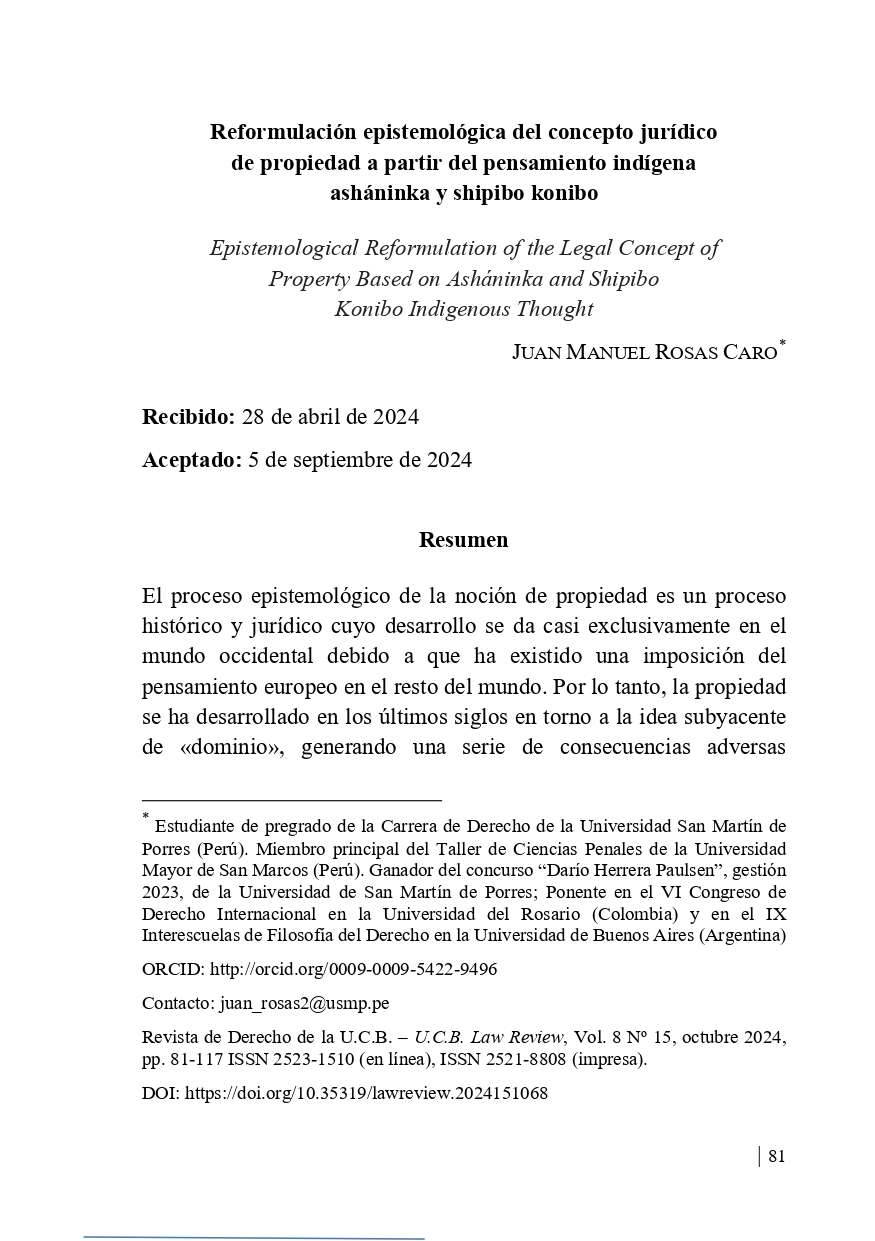Epistemological Reformulation of the Legal Concept of Property Based on Asháninka and Shipibo Konibo Indigenous Thought
DOI:
https://doi.org/10.35319/lawreview.202415108Keywords:
Shipibo Konibo, Asháninka, indigenous thought, continental law, protection sphere, propertyAbstract
The epistemological process of the notion of property is a historical and legal process whose development occurs almost exclusively in the Western world due to the imposition of European thought on the rest of the world. Therefore, property has been developed over the last centuries around the underlying idea of "dominion", which has had a series of adverse consequences on natural sources of wealth. In seeking to decolonize the institution of property, in this paper we propose the revaluation of indigenous ideology and worldview, specifically from the Peruvian Amazon, laying the groundwork for a legal concept of property that is more sustainable and preserves the future of humanity.
Downloads
References
Aguirrezabal Grünstein, M. (2006). Algunas precisiones en torno a los intereses supraindividuales (colectivos y difusos). Revista Chilena de Derecho, 33(1), 69-91.
AIDESEP & Fundación Telefónica. (2004). El ojo verde, cosmovisiones amazónicas.
Avendaño, J. (1994). El derecho de propiedad en la constitución. Revista Themis; (30), 117-122.
Avendaño, J. & Avendaño F. (2019). Derechos reales. Pontificia Universidad Católica del Perú; Fondo editorial.
Baena Upegui, M. (2003). Derecho real de dominio y propiedad privada (III) Función de la propiedad. Revista Opinión Jurídica, 2(3), 145-172.
Centro de Investigación de Lingüística Aplicada [CILA]-UNMSM. (2012). Shipibo: territorio, historia y cosmovisión. UNICEF.
Centro de Investigación de Lingüística Aplicada [CILA]-UNMSM. (2012). Asháninka: territorio, historia y cosmovisión. UNICEF.
Cordero Quinzacara, E. (2008). De la propiedad a las propiedades. la evolución de la concepción liberal de la propiedad. Revista de Derecho de la Pontificia Universidad Católica de Valparaíso, XXXI(2), 493-525.
Daros, W. (2019). ¿Tienen derechos naturales los animales no humanos?. Enfoques: Revista de la Universidad Adventista del Plata, 31 (2), 87-120.
Díaz, E. (1998) Curso de filosofía del derecho. Marcial Pons.
Espinosa, O., Molina, P. & Carlos, J. (2014). Los pueblos ashaninka, kakinte, nomatsigenga y yanesha. Ministerio de Cultura del Perú, Serie Nuestros Pueblos Indígenas, N°1.
Glave, L. (2003). La memoria y el futuro en la historia del Perú. En P. Oliart (Ed.), Territorio, cultura e historia (pp. 39-50). Instituto de Estudios Peruanos.
Kuhn, T. (1970). The Structure of Scientific Revolutions [La estructura de las revoluciones científicas]. University of Chicago.
Lander, E. (2000). La colonialidad del saber: Eurocentrismo y ciencias sociales. Perspectivas latinoamericanas. CLACSO.
Mendoza del Maestro, G. (2013). Apuntes sobre el derecho de propiedad a partir de sus contornos constitucionales. Revista Foro Jurídico, 97-108.
Pereira, C. (1996). Instituições de direito civil (12.a ed., T. IV). Editorial Forense.
Pinaglia-Villalón y Gavira, J. (2016). Aproximación al concepto de abuso del derecho del artículo 7.2 del Código Civil español. Anuario de derecho civil, 69(3), 925-949.
Posholi, L. (2020). Epistemic Decolonization as Overcoming the Hermeneutic Injustice of Eurocentrism [Descolonización epistémica como superación de la justicia hermenéutica del eurocentrismo]. Philosophical Papers.
Sage, C. & Woolcock, M. (2012). Introduction: Legal pluralism and development policy. In B. Z. Tamanaha, C. Sage & M. Woolcock (Eds.), Legal Pluralism and Development: Scholars and Practitioners in Dialogue (pp. 1-17). Cambridge University Press.
Schacherreiter, J. (2016). Postcolonial Theory and Comparative Law: On the Methodological and Epistemological Benefits to Comparative Law through Postcolonial Theory. Verfassung und Recht in Übersee, 49, 291-312.
Serra Rodriguez, A. (2023). Derecho civil III, derechos reales. De Verda y Beamonte & Serra Rodriguez (Coords.). Tirant lo Blanch.
Serrano Alonso, E. y Serrano Gomez, E. (2005). Manual de derechos reales. Editorial Ebisofer S. L.
Shawush, N. (2022). Decolonizing the Land: Revitalizing Indigenous Legal Traditions. University of Regina. https://opentextbooks.uregina.ca/decolonizingjustice/chapter/ chapter-1/
Umaña Chiricente, B. (2021). Narrativa de los seres espirituales: cosmovisión y cultura asháninka. Revista Amazonía Peruana, 17(34), 149-164.
Van Boven, T. (1982). Distinguishing criteria of human rights. En The international dimensions of human rights (pp. 43-59). Greenwod Press & UNESCO.
Varsi Rospigliosi, E. (2019). Tratado de derechos reales (T. III). Editorial de la Universidad de Lima.
Witker, Jorge. (1995). Metodología de la investigación jurídica. Mac Graw Hill. México.
Constitución Política del Estado [CPE]. 29 de diciembre de 1993 (Perú).

Downloads
Published
How to Cite
Issue
Section
License
Copyright (c) 2024 UCB Law Review

This work is licensed under a Creative Commons Attribution-NonCommercial-ShareAlike 4.0 International License.
The U.C.B. Law Review is an Open Access Journal, therefore, it is full free for access, reading, search, dowload, distribution and lawfull reuse in any medium only for non-comercial purposes, provided the original work is properly cited.








